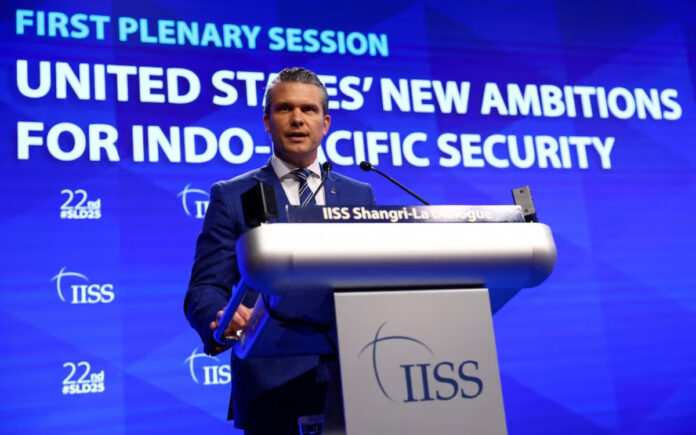Singapore: U.S. Defense Secretary Pete Hegseth issued a stark warning about the growing threat from China, calling it “real” and potentially “imminent”, while urging American allies in the Indo-Pacific to significantly increase their own defence spending.
Speaking at the Shangri-La Dialogue in Singapore — Asia’s premier platform for defence leaders and diplomats — Hegseth reaffirmed the Trump administration’s focus on the Indo-Pacific, delivering his most forceful remarks yet on China since assuming office in January.
“There’s no reason to sugar coat it. The threat China poses is real, and it could be imminent,” Hegseth declared. He cautioned that any military action by China to take over Taiwan would have “devastating consequences for the Indo-Pacific and the world,” echoing President Trump’s earlier statement that China would not invade Taiwan during his presidency.
China considers Taiwan a breakaway province and has vowed to reunify it with the mainland, by force if necessary. Military drills and pressure tactics around Taiwan have intensified in recent years. Taiwan’s government has firmly rejected Beijing’s claims, stating that the island’s future lies solely in the hands of its people.
“It has to be clear to all that Beijing is credibly preparing to potentially use military force to alter the balance of power in the Indo-Pacific,” Hegseth added.
In response, the Chinese embassy in Singapore condemned Hegseth’s remarks as provocative. “Mr. Hegseth repeatedly smeared and attacked China and relentlessly played up the so-called ‘China threat’,” it stated on Facebook. “As a matter of fact, the U.S. itself is the biggest ‘troublemaker’ for regional peace and stability.”
While the Trump administration’s push for greater defence spending from allies is not new, Hegseth’s tone at the Shangri-La Dialogue could cause discomfort among partners, even in a relatively supportive setting like Singapore. Notably, China’s Defence Minister Dong Jun skipped the event, sending only an academic delegation.
Previously, Hegseth had sharply criticised European allies for not investing enough in their own defence. At NATO headquarters in Brussels in February, he warned Europe against viewing the U.S. as a “sucker.” His remarks were backed by French President Emmanuel Macron, who acknowledged Hegseth’s call for increased European defence spending during the Dialogue’s keynote speech.
“It’s hard to believe, a little bit, after some trips to Europe that I’m saying this, but thanks to President Trump, Asian allies should look to countries in Europe as a new found example,” Hegseth said. “NATO members are pledging to spend 5% of their GDP on defence, even Germany. So it doesn’t make sense for countries in Europe to do that while key allies in Asia spend less on defence in the face of an even more formidable threat, not to mention North Korea.”
Also Read | Trump Signals Pakistan-US Trade Talks Next Week Amid Rising Economic Pressure
Dutch Defence Minister Ruben Brekelmans welcomed the acknowledgment of Europe’s progress, stating it was among the first times the U.S. administration had explicitly recognised it.
However, U.S. Democratic Senator Tammy Duckworth, co-leading a bipartisan delegation to the forum, criticised Hegseth’s tone, saying, “I thought it was patronising of our friends in the Indo-Pacific in particular.”
Meanwhile, a recent report by the London-based International Institute for Strategic Studies, the organiser of the Shangri-La Dialogue, highlighted that defence spending in Asia remains around 1.5% of GDP on average — a figure that has remained stable for a decade. Nonetheless, some countries have begun increasing investment in weapons, research, and indigenous defence capabilities in response to rising regional tensions.
Hegseth stressed that U.S. European allies should concentrate on continental security, allowing Washington to focus more strategically on China and North Korea in the Indo-Pacific region. “We would much prefer that the overwhelming balance of European investment be on that continent … so that as we partner there, which we will continue to do, we’re able to use our comparative advantage as an Indo-Pacific nation to support our partners here,” he said.
Also Read | Rabada Looks Ahead to WTC Final After Drug Ban: “Life Moves On”
Hegseth, a former Fox News host who spent much of his early tenure addressing domestic issues, reiterated traditional talking points, including the restoration of the “warrior ethos”. However, he also struck a note of cultural humility in his closing remarks.
“We are not here to pressure other countries to embrace or adopt our politics or ideology. We are not here to preach to you about climate change or cultural issues,” he said. “We respect you, your traditions and your militaries. And we want to work with you where our shared interests align.”



